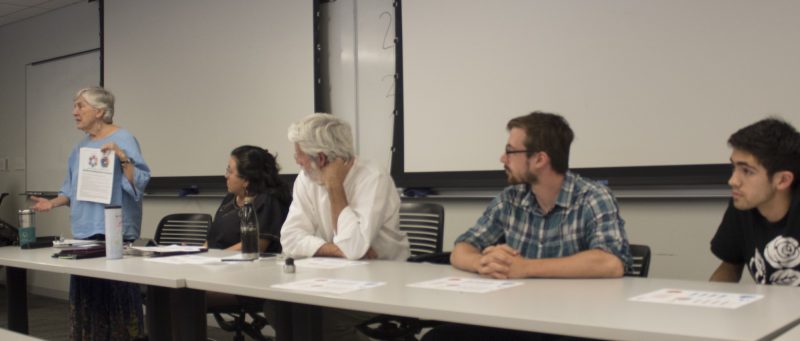The department of Sociology and Anthropology organized a meeting over the imminent issue of climate change and what Trinity can do to join San Antonio’s Climate Action Plan (CAP). Community activists, scholars and students were brought in to inform the attendees of different issues stemming from climate change.
Gregory Hazleton, professor of environmental studies; Alfred Montoya, associate professor of sociology and anthropology; and Meredith McGuire, professor of sociology, worked together to organize a meeting at Trinity. They discussed the city’s CAP and climate change issues such as equity, food waste and emissions.
“The goal [of the meeting] was to foster relationships among Trinity students and the city’s Climate Action and Adaptation Plan,” Hazleton said. “Trinity students have multiple possibilities for researching and taking action on campus that could be a part of the plan, and that research and action could spread beyond campus to our wider San Antonio community.”
McGuire and Montoya are a part of the City of San Antonio Climate Action and Adaptation Plan Committee. They are currently working on the CAP that the will require people in San Antonio to reduce emissions and waste. The professors spoke about how the Trinity community can be actively involved in making changes at the city level.
One speaker at the event was Mitchell Hagney, a Trinity alum and president of the San Antonio Food Policy Council. He offered the idea of doing experiments at Trinity and use the campus as a case study to develop CAP proposals, such as using the money at Trinity to test out the merit of renewable sources like solar panels.
“Case studies of that nature are quite useful here and could potentially develop into a proposal that could be viable for what the city would recommend in general,” Hagney said.
McGuire was one of the speakers at the meeting, and she covered the negative impact of rising temperatures on food, water and ecosystems.
“If the global temperature rises more than 1.5 degrees Celcius, it causes some very, very serious problems. And we are very close to that, it’s entirely possible that that rise, if we don’t change things very fast, might happen within the next 15 years,” McGuire said.
She explained that coal, gas and nuclear generation and transportation release the worst greenhouse emissions. She called for improvement and adaptations to be made at Trinity and across San Antonio to reduce energy consumption and emissions and create renewable energy sources so the harmful emissions can be closed down.
“There are ways that we can reduce our consumption very rapidly and, even more important, find a way to have Trinity have its own solar energy produced right here on campus,” McGuire said. “The other big way that we can think about it has to do with transportation emissions. One of the things San Antonio needs is a great deal more public transit.”
Trinity is reviewed by a Sustainability Tracking, Assessment and Rating System (STARS), that measures how Trinity invests its money into attending to climate change. Richard Reed, professor of sociology and anthropology, hopes for the Trinity community to put substantial investment in the environment.
“Right now, the city’s in the process of putting together a master plan that’s going to carry us through into the future,” Reed said. “This master plan is going to build us toward a green campus or away from a green campus. And I think it’s really important that we all be involved in moving it [towards green].”
Reed highlighted the changes that the Trinity campus has already made — like low-flow shower heads and an irrigation system using recycled water — that have effectively reduced water waste and electricity usage.
“It’s ways that you’ve changed your lifestyle and the things that have been introduced here that’s made a tremendous difference,” Reed said. “We’ve actually done a fair job of introducing green buildings on campus and reducing our electrical and our water demands as a result.”
The school’s leaders have implemented changes, but students can have an impact, too. Reed mentions environmental groups on campus — like EcoAllies and the Trinity Bee Alliance — that have helped improve the Trinity environment.
“There’s a whole range of student groups on campus that are really taking control of things and getting it done,” Reed said.
Students who aren’t able to start a new environmental initiative or to propose ideas to the city’s CAP can help reduce harm to the Earth in other ways. They can choose to walk to upper campus and Mabee Dining Hall instead of driving, remember to turn their room’s lights off or recycle and reduce their food waste.
“[Climate change is] probably the biggest issue that your generation of humans will deal with,” Montoya said. “These small things we can do in our daily lives that may seem trivial in aggregate contribute toward a larger more consequential thing, a vital climate action movement.”







